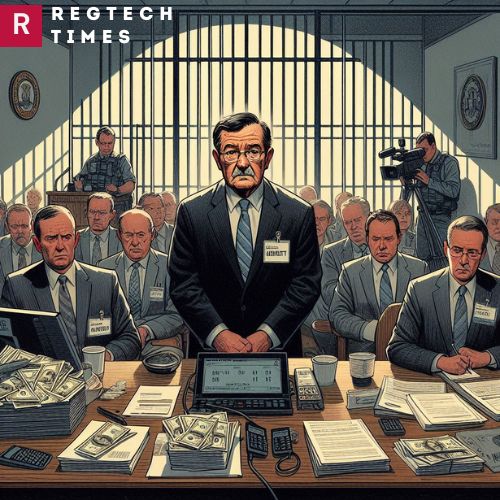On April 8, in a significant legal development, Jimmie Anthony “Jim” Beard, aged 60 and hailing from Fort Lauderdale, Florida, admitted guilt to charges of federal program theft and obstructing an IRS audit. Court records reveal that spanning from 2011 to 2018, Beard held the pivotal position of overseeing the City of Atlanta’s Department of Finance, wherein he bore the critical responsibility of safeguarding the city’s financial health.
However, as early as 2015, Beard concocted and executed a nefarious scheme. Leveraging his authoritative position as CFO, he orchestrated a plan to misappropriate funds and assets from the city of Atlanta for personal gain. These ill-gotten gains were purportedly utilized to finance lavish personal travels, extending to his indulgences, family members, and associates. Additionally, Beard stands accused of utilizing the embezzled funds to acquire and possess restricted firearms. This egregious betrayal of trust underscores the gravity of the charges laid against him.
What is Federal Program theft?
Federal program theft is the illegal act of misappropriating funds or resources from federally funded programs or agencies. Embezzlement, bribery, kickbacks, and the misuse of government funding or contracts are some examples of fraud. Individuals or entities involved in federal program theft frequently exploit flaws in government monitoring or accounting procedures to redirect cash for personal gain or illegal objectives. Such conduct may result in criminal prosecution and severe punishments, including fines, restitution, and jail.
Federal program theft can occur in a variety of government efforts, including social welfare programs, Medicare and Medicaid, defense contracts, infrastructure projects, research grants, and others. When funds intended for government programs are stolen or mishandled, they undermine their impact and potentially hurt the people or communities they were intended to help. This can result in restricted access to critical services, weakened national security, and a general loss of public trust in government institutions.
IRS Audit Reveals Beard’s Dubious Tax Practices and False Claims of Business Losses Unraveled
Furthermore, during his time as CFO, Beard participated in misleading methods with his income tax forms. Specifically, in 2013, he filed a tax return with the IRS, claiming that he ran a personal business with losses surpassing $33,500. However, during an audit in 2015, triggered by the investigation of these alleged losses, Beard submitted to the IRS receipts for flight and hotel accommodations, falsely labeling them as personal business costs. In truth, the City of Atlanta covered these charges undercover, using Beard’s City of Atlanta credit card, as part of his federal program theft plan.
Legal Proceedings and Announcements by Key Officials
Beard is scheduled for sentence on July 12th, and he could face a maximum prison term of 13 years. A federal district court judge will make the final decision on his punishment, taking into account a variety of variables, such as the United States Sentencing Guidelines and other statutory considerations.
The announcement was jointly made by Principal Deputy Assistant Attorney General Nicole M. Argentieri, who leads the Justice Department’s Criminal Division; U.S. Attorney Ryan Buchanan, representing the Northern District of Georgia; Assistant Director Michael Nordwall of the FBI’s Criminal Investigative Division; Special Agent in Charge Keri Farley from the FBI Atlanta Field Office; and Acting Special Agent in Charge Demetrius Hardeman of the IRS Criminal Investigation.
Conclusion
The Federal Bureau of Investigation (FBI) and the Internal Revenue Service Criminal Investigation Division (IRS-CI) are carefully investigating the case.
The case is being prosecuted by Trial Attorney Trevor Wilmot of the Criminal Division’s Public Integrity Section, as well as Assistant United States Attorneys Garrett Bradford and Tiffany Johnson representing the Northern District of Georgia. Notably, former Assistant U.S. Attorney Jeffrey Davis of the Northern District of Georgia has been a significant resource in the proceedings.
The FBI and the Department of Justice take federal program theft very seriously. Investigations into these offenses can be difficult, requiring collaboration between federal, state, and local officials. Individuals implicated in such offenses are often prosecuted under numerous federal statutes, including fraud, conspiracy, and theft of government property.
To detect and deter fraudulent activity, government entities use internal controls, audits, and monitoring procedures. Furthermore, whistleblowers play an important role in exposing injustice and making criminals responsible.
Individuals convicted of federal program theft may face harsh consequences such as lengthy prison sentences, hefty fines, confiscation of assets earned via unlawful activity, and future disqualification from government contracts or programs.
Raising awareness about the penalties of federal program theft through public education programs can help dissuade people from committing such crimes and urge them to report suspected fraud or abuse.


